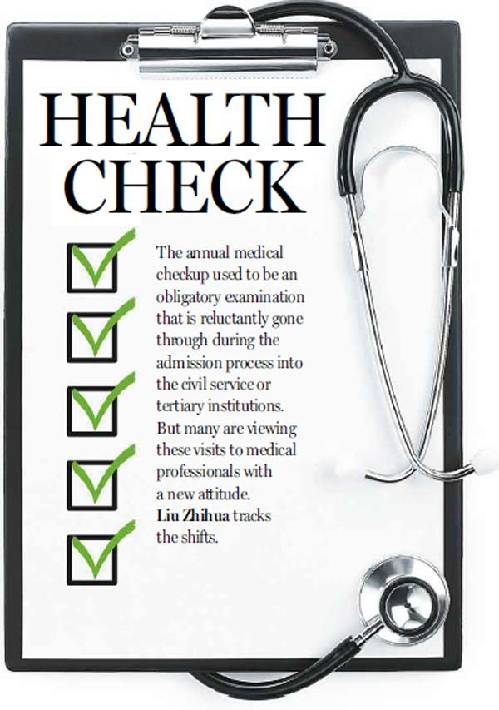
The annual medical checkup used to be an obligatory examination that is reluctantly gone through during the admission process into the civil service or tertiary institutions. But many are viewing these visits to medical professionals with a new attitude. Liu Zhihua tracks the shifts.
| ?
 |
It’s the year’s end and medical checkup facilities across the country are enjoying their busiest periods now. As the quality of living rises in China, those with deeper pockets and better awareness of health and wellness are more willing to invest in preventive medicine, especially the voluntary medical checkup.
"Medical checkups are part of staff welfare in my company. No one gives them up now,” says Long Qichao, who works with a tourism investment company based in Wuhan, Hubei’s provincial capital.
"Health matters a lot. Nowadays it is very expensive if you fall ill, and only early diagnosis can save both life and money. Besides, our company has already paid for the service.”
The company Long works for has about 90 employees. In October, they all went to an exclusive high-end medical checkup center for a thorough physical examination.
For many like Long, medical checkups have become an important part of preventive healthcare.
According to Nanfang Daily, a report just released by a Beijing-based market research company says there are now more than 8,000 medical checkup facilities in China at the end of 2011.
Each year, about 100 million people go through medical checkups, and the market is worth about 10 billion yuan ($1.6 billion), with the demand increasing by 25 percent year on year, according to the report.
Han Xiaohong, founder and president of the Ciming Health Checkup Management Group, says: “When I started the first private medical checkup center in Chaoyang district, Beijing in 2002, people thought we were crazy to ask healthy people to lie down and get tested.”
Han’s company now runs a network of nearly 50 clinics across China and serves 2 million people annually.
Although she had the foresight to predict the trend, even she has been caught by surprise by its rapid development. “The change is beyond my expectation.”
Han resigned from a famous military hospital to start her business in 2002. At that time, only the elite, such as high-ranking officials or influential academics, could afford and enjoy regular medical checkups, mainly subsidized by government.
For ordinary citizens, medical checks were mainly used to sort out unsuitable or sickly candidates for work or academic openings, or when the military has recruitment exercises, and colleges had new admissions.
"In the past, medical checkups were barriers that many tried to avoid. But people now view them in a different light,” says Guan Jie, director with Medical Checkup Center of China-Japan Friendship Hospital. Guan is also a committee member of the Beijing Health Management Association.
Citizens have realized the benefits of a thorough medical examination.
In Beijing, there are 182 medical checkup institutes open to the public, according to Guan.
At the China-Japan Friendship Hospital, the medical checkup facility has been expanded to accommodate 300 patients a day.
Previously, most of its clients were a small elite group of the rich and powerful, but now they come from all walks of life.
One of the reasons, Guan notes, is because as living standards rise, people are paying more attention to health matters.
Chronic ailments and lifestyle diseases, such as cardiovascular problems, cancers and diabetes, are also more common now.
The checks pay off, and Guan says his center has already helped diagnose several cases of early-stage cancers.
"Government campaigns to create awareness have also helped,” he says.
More than 30 percent of his clients buy the service at their own expense for themselves or for parents, Guan adds.
There are even people who go abroad for professional medical checkups.
Huang Minjin, 40, chief accountant with the Zhuhai branch of Panasonic Energy, is another believer who has noted changing attitudes.
"When I started annual medical checkups in 2004, few others around me did the same,” Huang recalls.
"People went to hospitals for physical examination only when they felt ill. Now everyone attaches great importance to regular checkups.”
Wu Jiang, 32, has paid for his parents-in-law to go for physical examinations every year since they arrived in Beijing six years ago, at the cost of 500 yuan ($80) each time.
"It is a necessary expenditure,” Wu says, adding that his 63-year-old mother-in-law was found to have mild hypertension during the checkup in 2011.
Huo Tao, a Beijing resident in her 30s, says she will actually look at the annual medical checks provided in a prospective employer’s remuneration package before deciding on the job.
But the importance of annual medical checks, whether self-financed or company-sponsored, is still very much limited to certain groups. For many of the less privileged, it is still bread-and-butter issues that take priority.
Liu Qi, 27, an engineer with the CITIC Groups in Xi’an, Shaanxi’s provincial capital, says the company is likely to skip medical checkups this year because of financial constraints.
In his hometown at Ankang city in Shaanxi, his parents don’t go for medical checkups.
"They think it unnecessary,” Liu says.
Contact the writer at [email protected].







